Marcia Thornton Jones's Blog, page 80
July 26, 2020
Motivation (Holly Schindler)
Here's the most freeing lesson I've learned about writing:
You really don't have to just push through it.
I used to think you did. I used to treat hard parts in writing like running. I used to tell myself I had to just keep moving, even though everything was hurting, because at some point, I was bound to get a second wind.
Seriously. You don't have to do that.
In writing, if it's painful, something is probably going wrong.
So stop. Instead of just plowing ahead, sentence after sentence, ask yourself what you want to do. Which direction your heart is calling you. Is it to a specific scene that probably isn't going to come for another fifty pages? Skip ahead! Write it! Are you thinking about a past chapter? Something just doesn't seem right with it? Play a game with it--turn it inside out. Brainstorm new possibilities!
Here's another one: Are you thinking of another idea? One that seems far more fun than this current project? Take a day to play with it! (Also: I've heard other authors say they sometimes work in one day a week for fun projects that have nothing to do with the current WIP--a day for poetry or a picture book or a short story, etc.)
Maybe your heart's calling you toward some new promo idea. Do it!
Are you sick of your surroundings? Take a page from me and Gus's book and head outside!
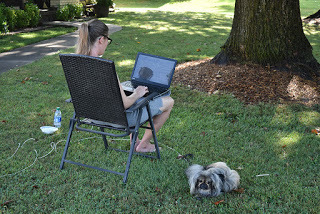
The thing is, a book is a really long project. It takes months. Working on the same thing over and over and over and over gets...
tedious.
And when it's tedious for you, it's guaranteed to be tedious for your readers.
It can be hard to get motivated when you're midway or so through such a big project. Don't hunker down. Don't just push through it. Mix it up!
You really don't have to just push through it.
I used to think you did. I used to treat hard parts in writing like running. I used to tell myself I had to just keep moving, even though everything was hurting, because at some point, I was bound to get a second wind.
Seriously. You don't have to do that.
In writing, if it's painful, something is probably going wrong.
So stop. Instead of just plowing ahead, sentence after sentence, ask yourself what you want to do. Which direction your heart is calling you. Is it to a specific scene that probably isn't going to come for another fifty pages? Skip ahead! Write it! Are you thinking about a past chapter? Something just doesn't seem right with it? Play a game with it--turn it inside out. Brainstorm new possibilities!
Here's another one: Are you thinking of another idea? One that seems far more fun than this current project? Take a day to play with it! (Also: I've heard other authors say they sometimes work in one day a week for fun projects that have nothing to do with the current WIP--a day for poetry or a picture book or a short story, etc.)
Maybe your heart's calling you toward some new promo idea. Do it!
Are you sick of your surroundings? Take a page from me and Gus's book and head outside!

The thing is, a book is a really long project. It takes months. Working on the same thing over and over and over and over gets...
tedious.
And when it's tedious for you, it's guaranteed to be tedious for your readers.
It can be hard to get motivated when you're midway or so through such a big project. Don't hunker down. Don't just push through it. Mix it up!
Published on July 26, 2020 05:00
July 22, 2020
Road Trip of Your Dreams: Smack Dab in the Imagination by Dia Calhoun
COVID-19 may have us parked at home this summer, but that's no reason not to crank up your imagination and set out on the road trip of your dreams. Where do you want to go? Italy? Sure, you could Google walk the duomo in Siena, but why choose a destination you could actually physically visit? Why not choose a destination--or the entire journey--you can ONLY visit in your imagination?
I wanted to go to Huntsville, Alabama. You heard me right. I planned to visit the Butterfly House in the famous Botanical Gardens with a friend--until, you guessed it--COVID-19. Since I can't do that, this summer I am takinga road trip as a butterfly. I'm going to choose a fifty mile route and see a little piece of the world with new eyes. I can't take any luggage. No coffee. What will the rest stops be like? What will be wondrous to me as a butterfly that I'd pass right by as a lumbering human?
Stay tuned.
Wouldn't this be fun to do with your kids?
I wanted to go to Huntsville, Alabama. You heard me right. I planned to visit the Butterfly House in the famous Botanical Gardens with a friend--until, you guessed it--COVID-19. Since I can't do that, this summer I am takinga road trip as a butterfly. I'm going to choose a fifty mile route and see a little piece of the world with new eyes. I can't take any luggage. No coffee. What will the rest stops be like? What will be wondrous to me as a butterfly that I'd pass right by as a lumbering human?
Stay tuned.
Wouldn't this be fun to do with your kids?
Published on July 22, 2020 22:30
July 20, 2020
Free Pass of Permission to "Let Go"
"Getting stuck" is a problem all authors face at one time or another. People have different names for it - writer's block, hitting the wall, or creative burnout, but what you call it isn't what's important. How you get yourself past it is what really matters.
I have found that the best path for me in getting "unstuck" or "creatively inspired" is giving myself permission to step back from my work and do something different, sometimes something completely different. Though this can be hard to do, especially if I'm under any kind of deadline, it is sometimes the most direct way to getting back to the place I want to be with my work.
Even though on many occasions I've proven this to be true for my own writing process, it sometimes takes me awhile to come to the conclusion that it will be well worth my while to let myself "let go" a little. So, because of that, I thought I'd do all of you the favor of listing some of my favorite ways to "let go" and then giving you one Free Pass of Permission to use any or all of these ideas next time you find yourself facing writer's block or creative burnout. You might be surprised by how quickly one of these very ordinary activities leads to an extremely extraordinary inspiration giving you just what you need to get back to your work.
Read a bookTake a walkPage through a mail-order catalogBrowse around a thrift storeColor in a coloring bookWatch old rerunsListen to musicBake somethingCook somethingClean a closetLook at an old yearbookDo a puzzleWork on a photo albumCrochet or knitSew
Sometimes I only have to step away from my work for an hour or an afternoon. Other times I find it takes me days of sewing projects or multiple batches of brownies to find my inspiration. But whatever it takes, it's always such a wonderful feeling when my relaxing activities finally get those creative juices flowing and I find myself sitting at my laptop happily moving forward again, sometimes while a gooey, chocolate brownie cools off on my desk.
Happy Writing and Reading,
Nancy J. Cavanaugh
www.nancyjcavanaugh.com
I have found that the best path for me in getting "unstuck" or "creatively inspired" is giving myself permission to step back from my work and do something different, sometimes something completely different. Though this can be hard to do, especially if I'm under any kind of deadline, it is sometimes the most direct way to getting back to the place I want to be with my work.
Even though on many occasions I've proven this to be true for my own writing process, it sometimes takes me awhile to come to the conclusion that it will be well worth my while to let myself "let go" a little. So, because of that, I thought I'd do all of you the favor of listing some of my favorite ways to "let go" and then giving you one Free Pass of Permission to use any or all of these ideas next time you find yourself facing writer's block or creative burnout. You might be surprised by how quickly one of these very ordinary activities leads to an extremely extraordinary inspiration giving you just what you need to get back to your work.
Read a bookTake a walkPage through a mail-order catalogBrowse around a thrift storeColor in a coloring bookWatch old rerunsListen to musicBake somethingCook somethingClean a closetLook at an old yearbookDo a puzzleWork on a photo albumCrochet or knitSew
Sometimes I only have to step away from my work for an hour or an afternoon. Other times I find it takes me days of sewing projects or multiple batches of brownies to find my inspiration. But whatever it takes, it's always such a wonderful feeling when my relaxing activities finally get those creative juices flowing and I find myself sitting at my laptop happily moving forward again, sometimes while a gooey, chocolate brownie cools off on my desk.
Happy Writing and Reading,
Nancy J. Cavanaugh
www.nancyjcavanaugh.com
Published on July 20, 2020 04:30
July 19, 2020
Proceed With Caution, by Chris Tebbetts
Before my actual blog entry, here’s a little relevant but blatant self-promotion, on this month’s topic of productivity. The workshop that I teach with Erin Dionne at Highlights Foundation, “Getting Your Middle Grade or Young Adult Novel Unstuck” is now available as an on-demand online course, through Highlights’ website. This packaged version includes recorded lectures and hands-on writing workshops; access to to discussion boards; monthly “office hours”; and one-on-one Zoom consultations with Erin or me. You can read all about the workshop here and/or feel free to post questions for me in the comments below. And meanwhile….
STAYING PRODUCTIVE IN TIMES OF UNCERTAINTY
About a year ago, I started focusing more on a particular part of my creative process: the uncomfortable part. By that, I mean the “wandering in the wilderness” part; the not-knowing-what-to-write part; the part where I’m sitting for long stretches at my computer with a big “I don’t know” thought bubble over my head.
Put another way, I’ve been trying to learn how to get more comfortable with the discomfort of not knowing how to proceed with a given story. Which is, after all, a huge part of the way I spend my writing time.
Still, all that not-knowing can be a very uncreative space. It produces a lot of anxiety, and for me, that anxiety is like muse repellent. Those moments where I can’t see the road ahead are the ones where I most often want to walk away from the computer, or even worse, give up on my story altogether. I’m guessing the same is true for a lot of writers.
Now, flash forward to 2020. Nobody quite knows where the COVID pandemic is headed, or how long it’s going to last, or even what’s going to happen next. A lot of people I know have said that living in COVID’s shadow has been a distinctly challenging time for their own creativity. The writing is difficult to get to, and even then, it can feel trivial and all too easy to abandon.
Sound familiar?
It’s been interesting to see how something I was already grappling with on the creative side has now echoed its way into my life in general. In both cases, the question is the same: How do I stay productive and keep going in the face of the unknown?
On the optimistic side, I feel as though these past several months have acted as a kind of de facto call for all of us to try and live as much in the present moment as possible, and to work harder than ever at not letting the unknown future exert too much influence on our own well-being. That’s all easier said than done, of course, but the first step in that direction for me has always started with an awareness of the problem itself.
Mary Oliver has said that “scary events are practice for noticing what’s going on.” For me, that kind of noticing is like turning a red light into a yellow one. It doesn’t let me go full speed ahead, necessarily, but it does help me proceed with caution, which is everything when the alternative is shutting down completely.
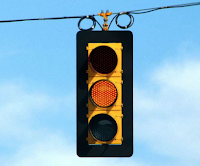
Another bit of advice that I like came to me from Peter Crone, when he was a guest on the “Commune” podcast. The thing I most took away from that interview was Crone’s suggestion that we try to see “I don’t know” as a neutral statement when we're faced with the anxiety of an undefined future. For instance, “I don’t know how to finish this story” can feel a whole lot like “I’m afraid this story will be impossible to finish" if I let it. Likewise, “I don’t know when my life will go back to normal” can feel a lot like “What if life never goes back to normal?”
But in both cases, the only real fact on the table is my own not-knowing. It's a nuanced kind of thing, but sometimes the goal doesn’t have to be about getting rid of the anxiety so much as it is about learning to manage it, and realizing that all "I don't know" really means is, "I don't know yet."
I’ve been trying to apply that line of reasoning to my work for a while now, and it’s been interesting to see how, more recently, the same learning curve has presented itself in my non-work life as well.
And why not? Writing always has something to teach me about life—and vice versa—life always has something to teach me about writing, too.
STAYING PRODUCTIVE IN TIMES OF UNCERTAINTY
About a year ago, I started focusing more on a particular part of my creative process: the uncomfortable part. By that, I mean the “wandering in the wilderness” part; the not-knowing-what-to-write part; the part where I’m sitting for long stretches at my computer with a big “I don’t know” thought bubble over my head.
Put another way, I’ve been trying to learn how to get more comfortable with the discomfort of not knowing how to proceed with a given story. Which is, after all, a huge part of the way I spend my writing time.
Still, all that not-knowing can be a very uncreative space. It produces a lot of anxiety, and for me, that anxiety is like muse repellent. Those moments where I can’t see the road ahead are the ones where I most often want to walk away from the computer, or even worse, give up on my story altogether. I’m guessing the same is true for a lot of writers.
Now, flash forward to 2020. Nobody quite knows where the COVID pandemic is headed, or how long it’s going to last, or even what’s going to happen next. A lot of people I know have said that living in COVID’s shadow has been a distinctly challenging time for their own creativity. The writing is difficult to get to, and even then, it can feel trivial and all too easy to abandon.
Sound familiar?
It’s been interesting to see how something I was already grappling with on the creative side has now echoed its way into my life in general. In both cases, the question is the same: How do I stay productive and keep going in the face of the unknown?
On the optimistic side, I feel as though these past several months have acted as a kind of de facto call for all of us to try and live as much in the present moment as possible, and to work harder than ever at not letting the unknown future exert too much influence on our own well-being. That’s all easier said than done, of course, but the first step in that direction for me has always started with an awareness of the problem itself.
Mary Oliver has said that “scary events are practice for noticing what’s going on.” For me, that kind of noticing is like turning a red light into a yellow one. It doesn’t let me go full speed ahead, necessarily, but it does help me proceed with caution, which is everything when the alternative is shutting down completely.

Another bit of advice that I like came to me from Peter Crone, when he was a guest on the “Commune” podcast. The thing I most took away from that interview was Crone’s suggestion that we try to see “I don’t know” as a neutral statement when we're faced with the anxiety of an undefined future. For instance, “I don’t know how to finish this story” can feel a whole lot like “I’m afraid this story will be impossible to finish" if I let it. Likewise, “I don’t know when my life will go back to normal” can feel a lot like “What if life never goes back to normal?”
But in both cases, the only real fact on the table is my own not-knowing. It's a nuanced kind of thing, but sometimes the goal doesn’t have to be about getting rid of the anxiety so much as it is about learning to manage it, and realizing that all "I don't know" really means is, "I don't know yet."
I’ve been trying to apply that line of reasoning to my work for a while now, and it’s been interesting to see how, more recently, the same learning curve has presented itself in my non-work life as well.
And why not? Writing always has something to teach me about life—and vice versa—life always has something to teach me about writing, too.
Published on July 19, 2020 11:46
July 16, 2020
Motivating yourself in these strange times, by Michele Weber Hurwitz
To say we're living in a strange, new normal is the understatement of 2020. This month on the blog, we're talking about motivation, and I freely admit, I don't have much these days! Many of the old, proven strategies -- set goals, find a dedicated writing space, commit to a regular time, try writing prompts when stuck -- just aren't working the way they used to.
My goals don't seem as clear, my writing space has changed with two family members also working at home, and my writing time? What was that again?
But I have found a few silver linings in this dark cloud we're all collectively under, and they are helping to nurture my brain and soul, with the hope that one day, I'll feel motivated again. They are three simple things -- finding peace and joy in nature, taking breaks from news and social media, and finding something good in every day.
Walking or biking along the forest preserve paths where I live in Illinois has been restorative and has definitely lifted my spirits. I tuck a small notebook in my pocket and stop to jot a few words when inspiration strikes, even if they're just random thoughts that will never be part of a story.

Early in the pandemic, I was addicted to the endless news cycle and checked the apps on my phone numerous times a day. I realized that was making me a nervous wreck, so I lessened how much I read the news. And social media...there are times the noise and chatter are too overwhelming, so I've also reduced the amount of time I spend on Twitter, Facebook, and Instagram. This has cleared space for more positive, hopefully soon-to-be productive thoughts.
Finding something good and happy is easy, because all it takes is noticing. There's an older woman in my neighborhood who walks every day. She's very hunched over, and can barely lift her head, but she's outside, pushing her walker over the bumps in the sidewalk and inching along. I said hello the other day and introduced myself. The few shared words warmed my heart, and I hope, hers.
I've been noticing things more than I used to, which I've read so many of us are doing, like ordinary parts of the world are suddenly more present. The intricate, fascinating way a bird's nest is constructed. How the wind sways the wildflowers in back of my house and how they always stand up straight again. Raindrops sliding down a window pane. The mesmerizing flight of a hummingbird.
If you're struggling with motivation too, my advice is to let it be right now. Put down your phone, get outside, and notice. That's the work of a writer too.
Michele Weber Hurwitz is the author of five middle grade novels, from Random House and Simon & Schuster. Find her online at micheleweberhurwitz.com.
My goals don't seem as clear, my writing space has changed with two family members also working at home, and my writing time? What was that again?
But I have found a few silver linings in this dark cloud we're all collectively under, and they are helping to nurture my brain and soul, with the hope that one day, I'll feel motivated again. They are three simple things -- finding peace and joy in nature, taking breaks from news and social media, and finding something good in every day.
Walking or biking along the forest preserve paths where I live in Illinois has been restorative and has definitely lifted my spirits. I tuck a small notebook in my pocket and stop to jot a few words when inspiration strikes, even if they're just random thoughts that will never be part of a story.

Early in the pandemic, I was addicted to the endless news cycle and checked the apps on my phone numerous times a day. I realized that was making me a nervous wreck, so I lessened how much I read the news. And social media...there are times the noise and chatter are too overwhelming, so I've also reduced the amount of time I spend on Twitter, Facebook, and Instagram. This has cleared space for more positive, hopefully soon-to-be productive thoughts.
Finding something good and happy is easy, because all it takes is noticing. There's an older woman in my neighborhood who walks every day. She's very hunched over, and can barely lift her head, but she's outside, pushing her walker over the bumps in the sidewalk and inching along. I said hello the other day and introduced myself. The few shared words warmed my heart, and I hope, hers.
I've been noticing things more than I used to, which I've read so many of us are doing, like ordinary parts of the world are suddenly more present. The intricate, fascinating way a bird's nest is constructed. How the wind sways the wildflowers in back of my house and how they always stand up straight again. Raindrops sliding down a window pane. The mesmerizing flight of a hummingbird.
If you're struggling with motivation too, my advice is to let it be right now. Put down your phone, get outside, and notice. That's the work of a writer too.
Michele Weber Hurwitz is the author of five middle grade novels, from Random House and Simon & Schuster. Find her online at micheleweberhurwitz.com.
Published on July 16, 2020 05:30
July 12, 2020
National Boredom Month...Are You Bored Yet? by Darlene Beck Jacobson
Being confined to the house and our own backyards these past four months has led to many adjustments and challenges. How to occupy our time productively might be one of them. How many closets have we cleaned? How much Netflix have we streamed? How many jigsaw puzzles have we completed? How many pizzas have we consumed?
For some of us, the boredom of our forced isolation may have set in, making us itchy for something, anything different. Here's where imagination comes in handy.
I hope no one will judge me or pass criticism when I say this, but I am one of those people who is rarely if ever BORED. When I retired from teaching in 2010, the first question I was asked was "Won't you be bored in your retirement, with no work to do?"
My answer then and now has always been this: There are not enough hours in the day in which to pursue all the things I am interested in. Exploring nature, reading, writing, quilting, gardening, learning to play a musical instrument, crafting, traveling to places I've never been, learning new things, problem solving, making something new - whether it's a recipe or a stained-glass panel, meeting up with friends old and new. The list is long and continues to grow.
So, for me the best way to celebrate a thing like boredom is to ask yourself: Now that I have more free time than I'll probably ever have for a long while, what do I want to do?
Grow a giant pumpkin? Be the best pool player in town? Hike somewhere you've never gone before? Taste every craft beer in your state? Learn how to MAKE craft beer?
Then...cape diem! Make it happen. Enjoy this gift of time and make your dreams reality.
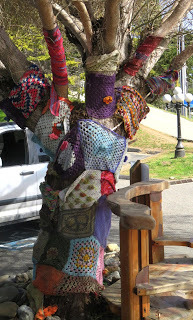
For some of us, the boredom of our forced isolation may have set in, making us itchy for something, anything different. Here's where imagination comes in handy.
I hope no one will judge me or pass criticism when I say this, but I am one of those people who is rarely if ever BORED. When I retired from teaching in 2010, the first question I was asked was "Won't you be bored in your retirement, with no work to do?"
My answer then and now has always been this: There are not enough hours in the day in which to pursue all the things I am interested in. Exploring nature, reading, writing, quilting, gardening, learning to play a musical instrument, crafting, traveling to places I've never been, learning new things, problem solving, making something new - whether it's a recipe or a stained-glass panel, meeting up with friends old and new. The list is long and continues to grow.
So, for me the best way to celebrate a thing like boredom is to ask yourself: Now that I have more free time than I'll probably ever have for a long while, what do I want to do?
Grow a giant pumpkin? Be the best pool player in town? Hike somewhere you've never gone before? Taste every craft beer in your state? Learn how to MAKE craft beer?
Then...cape diem! Make it happen. Enjoy this gift of time and make your dreams reality.

Published on July 12, 2020 06:00
July 11, 2020
When the Boredom Vanishes by Jody Feldman
There came a time in early May when the countdown started. First it was weeks, then days, hours, minutes until three, two, one -- cue the Alice Cooper song -- school's out for the summer!
How sweet it was when, suddenly, the only multiple-choice test included these possible answers:
 A. Banana Popsicle
A. Banana Popsicle
B. Ice cream sandwich
C. Dreamsicle
D. Drumstick
It seemed, though, that about four weeks into summer vacation, I'd keep asking my mom, "What should I do?" as if I lived in the middle of a void.
I did not live in a void. There were toys and brothers and neighbors. There was a wading pool, weekly trips to the library, and plenty of art supplies. But it always felt as if something else was out there, just out of reach; something more exciting, adventurous, if only I could claim it.
Maybe that's why I write now, to claim those unrealized adventures for my younger self, the ones that exist just beyond the realities of life: a puzzle waiting below the basement, a secret hidden in the walls, an undiscovered treasure that’s just a neighborhood away.
Dreaming up twists and turns for my characters gets me so pumped, it’s as if I’ll never get bored. However, in the middle of a difficult draft, I revert to that schoolkid.
I find myself wrestling with the right words, the right scenes and I sit back, promising myself that when I conquer this story (for now), I will take a week and do little besides watching guilty-pleasure movies, playing computer games, and pondering Popsicle flavors.
But half a day in, when the longing starts, I realize what I didn't as a kid. My writing, like school, fills me up more than anything outside of friends and family. I start brainstorming something new. And my boredom vanishes.
How sweet it was when, suddenly, the only multiple-choice test included these possible answers:
 A. Banana Popsicle
A. Banana PopsicleB. Ice cream sandwich
C. Dreamsicle
D. Drumstick
It seemed, though, that about four weeks into summer vacation, I'd keep asking my mom, "What should I do?" as if I lived in the middle of a void.
I did not live in a void. There were toys and brothers and neighbors. There was a wading pool, weekly trips to the library, and plenty of art supplies. But it always felt as if something else was out there, just out of reach; something more exciting, adventurous, if only I could claim it.
Maybe that's why I write now, to claim those unrealized adventures for my younger self, the ones that exist just beyond the realities of life: a puzzle waiting below the basement, a secret hidden in the walls, an undiscovered treasure that’s just a neighborhood away.
Dreaming up twists and turns for my characters gets me so pumped, it’s as if I’ll never get bored. However, in the middle of a difficult draft, I revert to that schoolkid.
I find myself wrestling with the right words, the right scenes and I sit back, promising myself that when I conquer this story (for now), I will take a week and do little besides watching guilty-pleasure movies, playing computer games, and pondering Popsicle flavors.
But half a day in, when the longing starts, I realize what I didn't as a kid. My writing, like school, fills me up more than anything outside of friends and family. I start brainstorming something new. And my boredom vanishes.
Published on July 11, 2020 04:00
July 8, 2020
My Questing Helper -- by Jane Kelley
On March 23, shortly after we all began staying safer at home, I began a new novel. I was very excited. It was going to be a great escape for readers––and me. Most importantly, it was going to be FUNNY. After a month of writing, I had reached the middle. I hate the middle of a first draft under normal circumstances. And these days are anything but normal.
Doubts crept in. I tried tricks. I watched a lot of inspirational webinars. I read mentor texts. I changed the plot. I added characters. Nothing was helping. One day I announced to my family that I had fired Jane Kelley from the project. She wasn't pulling her weight. She was, to quote an ancient and reprehensible politician, a nattering nabob of negativity.
My family talked me back from the ledge. But there were certain aspects I couldn't solve. Chief among them was the sinking sense that this project was destined to remain IN THE DRAWER.
But––unbeknownst to me––an odd kind of help was on the way.
I should say that we live at the edge of a woods called Fairy Chasm. A century ago someone thought the children resembled fairies as they ran along the paths. Now wild turkeys and deer gambol there. We love to see them. But one of those deer shed a tick.
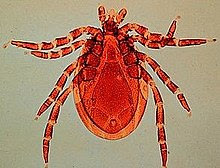 Ixodes
scapularis
--commonly known as the deer tick
That tick waited in a position known as "questing." Its back legs clung to a branch. Its front legs were outstretched, searching for an animal's body heat. It needed someone to feed on. It found me.
Ixodes
scapularis
--commonly known as the deer tick
That tick waited in a position known as "questing." Its back legs clung to a branch. Its front legs were outstretched, searching for an animal's body heat. It needed someone to feed on. It found me.
I don't know when. I don't even know where it bit me. All I know is that in mid June, my struggles at my desk abruptly ceased. I had a fever, chills, and a splitting headache. I spent the weekend as a horizontal person––apart from a brief excursion to get a COVID test, which was negative.
When I rejoined the vertical world, I felt a surge of energy. Renewed. Inspired. Ready to get back to work. Amazingly, I read an article in the New York Times that solved the problem of how to end my novel. It was a miracle!
And then, the next day, I noticed an angry red rash on my chest. Hmm. Could I have Lyme disease? My test for that was positive. I was given a prescription for antibiotics. After another day, the rash faded. All symptoms disappeared. But my newfound determination remained.
I joked with a writer friend that my infection had cured my malaise. My brain had been preoccupied with all the reasons why I shouldn't be writing. The fever had burnt away my doubts. After those clouds of smoke had been blown away, there was much more room for creativity.
Believe me, I'm not suggesting that getting sick is the solution. All too often it causes worse problems. Far better to find other ways to clear one's head. Like taking a walk in the woods (wearing long pants and sprayed with tick repellant).
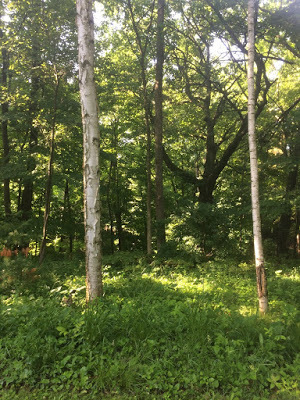 The woods behind our house
The woods behind our house
Doubts crept in. I tried tricks. I watched a lot of inspirational webinars. I read mentor texts. I changed the plot. I added characters. Nothing was helping. One day I announced to my family that I had fired Jane Kelley from the project. She wasn't pulling her weight. She was, to quote an ancient and reprehensible politician, a nattering nabob of negativity.
My family talked me back from the ledge. But there were certain aspects I couldn't solve. Chief among them was the sinking sense that this project was destined to remain IN THE DRAWER.
But––unbeknownst to me––an odd kind of help was on the way.
I should say that we live at the edge of a woods called Fairy Chasm. A century ago someone thought the children resembled fairies as they ran along the paths. Now wild turkeys and deer gambol there. We love to see them. But one of those deer shed a tick.
 Ixodes
scapularis
--commonly known as the deer tick
That tick waited in a position known as "questing." Its back legs clung to a branch. Its front legs were outstretched, searching for an animal's body heat. It needed someone to feed on. It found me.
Ixodes
scapularis
--commonly known as the deer tick
That tick waited in a position known as "questing." Its back legs clung to a branch. Its front legs were outstretched, searching for an animal's body heat. It needed someone to feed on. It found me.I don't know when. I don't even know where it bit me. All I know is that in mid June, my struggles at my desk abruptly ceased. I had a fever, chills, and a splitting headache. I spent the weekend as a horizontal person––apart from a brief excursion to get a COVID test, which was negative.
When I rejoined the vertical world, I felt a surge of energy. Renewed. Inspired. Ready to get back to work. Amazingly, I read an article in the New York Times that solved the problem of how to end my novel. It was a miracle!
And then, the next day, I noticed an angry red rash on my chest. Hmm. Could I have Lyme disease? My test for that was positive. I was given a prescription for antibiotics. After another day, the rash faded. All symptoms disappeared. But my newfound determination remained.
I joked with a writer friend that my infection had cured my malaise. My brain had been preoccupied with all the reasons why I shouldn't be writing. The fever had burnt away my doubts. After those clouds of smoke had been blown away, there was much more room for creativity.
Believe me, I'm not suggesting that getting sick is the solution. All too often it causes worse problems. Far better to find other ways to clear one's head. Like taking a walk in the woods (wearing long pants and sprayed with tick repellant).
 The woods behind our house
The woods behind our house
Published on July 08, 2020 06:35
July 4, 2020
Celebrate Smack Dab News!
Happy Independence Day to all our followers! Smack Dab bloggers have a few extra things to celebrate:
Published on July 04, 2020 05:00
June 28, 2020
An Author's Best Friend...
By Charlotte Bennardo
One of the themes this month is National Pet Month. I have the stereotypical author's cat. Actually, I have two.
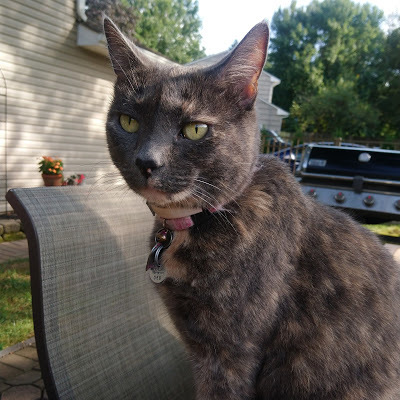
This is Casey. She's a rescue from our local shelter. (I only adopt rescues, I don't 'do' designer/pure breds.) She's named after a character I played in a college play, Ms. Casewell of Agatha Christie's The Mousetrap. She is constantly walking across my desk, or trying to jump into my lap while I'm working in my office. And if I don't pay attention, she bams me.

Mink is a constant companion. If I'm in my office, he's sleeping on the printer. If I'm working on the family room couch, he's laying next to me or nearby on his cat perch. At night, he sleeps on the loveseat in my bedroom. Outside, he's under the patio table when I sit there. He, too, is a rescue from a barn in Upstate, NY. He's named for his long, silky fur. Such a handsome beast.
One of the causes I support is my local animal shelter- I create an 'angel' tree during Advent (the four weeks preceding Christmas) and my church congregation drops off pet supplies for the shelter, which I take to the shelter. Another cause is abused animals, which I am quite vocal about. Most pet owners treat their fur babies as dearly as biological children but there are those who don't.....
Many of our beloved favorite books are based on pets. My favorite is Beautiful Joe, written by Marshall Saunders and it's based on the early beginnings of the American Society for the Prevention of Cruelty to Animals. Think about Old Yeller by Fred Gipson, My Friend Flicka by Mary O'Hara, or these more modern books:
Can I Be Your Dog? by Troy Cummings
The Perfect Pet by Margie Palatini
Strictly No Elephants by Lisa Mantchev
Just Me and My Puppy by Mercer Mayer
The Rainbow Bridge by Adrian Raeside
Oh The Pets You Can Get by Tish Rabe, et al
Saying Goodbye to Lulu by Corinne Demas
The list of books goes on from fiction to non-fiction, serious to silly. My favorite comic was Garfield and favorite animated strip is Simon's Cat. And because I love all animals, pet or wild, I always include one or more in my writings. Even if you don't have a pet, please consider donating food, supplies, or money. If a beloved pet dies, clean pet beds, carriers, leashes, bowls, etc. (only in like new/excellent condition please!) and take them to your local shelter. You can even designate a charity to receive funds through the Amazon Smile program. Little amounts add up and with so many abandoned, abused, hoarded, or feral animals, you can be a lifesaver.
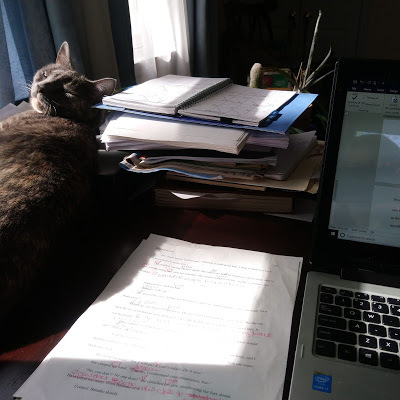
So Happy National Pet Month!
One of the themes this month is National Pet Month. I have the stereotypical author's cat. Actually, I have two.

This is Casey. She's a rescue from our local shelter. (I only adopt rescues, I don't 'do' designer/pure breds.) She's named after a character I played in a college play, Ms. Casewell of Agatha Christie's The Mousetrap. She is constantly walking across my desk, or trying to jump into my lap while I'm working in my office. And if I don't pay attention, she bams me.

Mink is a constant companion. If I'm in my office, he's sleeping on the printer. If I'm working on the family room couch, he's laying next to me or nearby on his cat perch. At night, he sleeps on the loveseat in my bedroom. Outside, he's under the patio table when I sit there. He, too, is a rescue from a barn in Upstate, NY. He's named for his long, silky fur. Such a handsome beast.
One of the causes I support is my local animal shelter- I create an 'angel' tree during Advent (the four weeks preceding Christmas) and my church congregation drops off pet supplies for the shelter, which I take to the shelter. Another cause is abused animals, which I am quite vocal about. Most pet owners treat their fur babies as dearly as biological children but there are those who don't.....
Many of our beloved favorite books are based on pets. My favorite is Beautiful Joe, written by Marshall Saunders and it's based on the early beginnings of the American Society for the Prevention of Cruelty to Animals. Think about Old Yeller by Fred Gipson, My Friend Flicka by Mary O'Hara, or these more modern books:
Can I Be Your Dog? by Troy Cummings
The Perfect Pet by Margie Palatini
Strictly No Elephants by Lisa Mantchev
Just Me and My Puppy by Mercer Mayer
The Rainbow Bridge by Adrian Raeside
Oh The Pets You Can Get by Tish Rabe, et al
Saying Goodbye to Lulu by Corinne Demas
The list of books goes on from fiction to non-fiction, serious to silly. My favorite comic was Garfield and favorite animated strip is Simon's Cat. And because I love all animals, pet or wild, I always include one or more in my writings. Even if you don't have a pet, please consider donating food, supplies, or money. If a beloved pet dies, clean pet beds, carriers, leashes, bowls, etc. (only in like new/excellent condition please!) and take them to your local shelter. You can even designate a charity to receive funds through the Amazon Smile program. Little amounts add up and with so many abandoned, abused, hoarded, or feral animals, you can be a lifesaver.

So Happy National Pet Month!
Published on June 28, 2020 18:06



